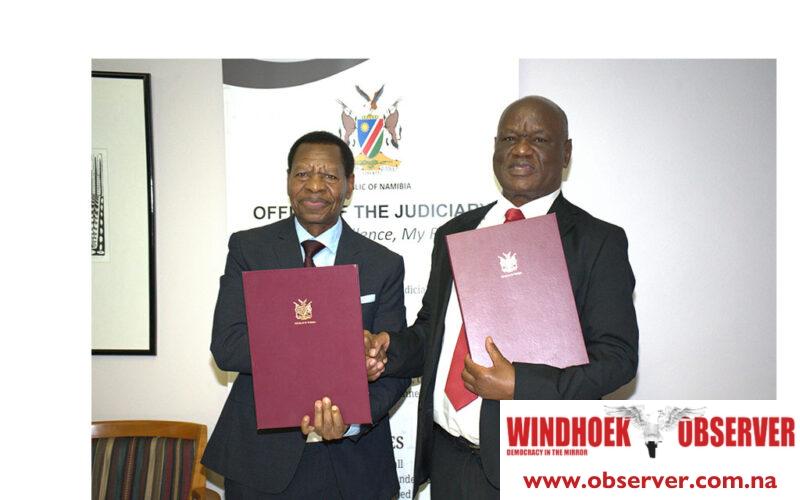Niël Terblanché
Namibia and Zimbabwe have signed a Memorandum of Understanding (MoU), aiming to enhance cooperation and exchange between the two countries’ judicial systems.
The MoU, signed by Chief Justice Peter Shivute of Namibia and Chief Justice Luke Malaba of Zimbabwe, outlines comprehensive areas of collaboration, including training programmes for judges, court officials, and legal professionals, as well as advancements in court administration and judicial education.
The signing ceremony in Windhoek was attended by senior judges, court officials, and legal professionals from both nations and marked a key moment in the judicial history of Namibia and Zimbabwe.
Chief Justice Shivute lauded the occasion as the formalisation of an enduring friendship and brotherhood between the two nations.
He welcomed Chief Justice Malaba and his delegation to Namibia, emphasising the long-standing excellent relations between their governments and now their judiciaries.
“Our two nations share a deep-rooted history of cooperation and solidarity, not only at a bilateral level but also through our joint efforts in multilateral forums such as the United Nations, the African Union, the Southern African Development Community (SADC), and the Southern and Eastern African Chief Justices’ Forum (SEACJF),” Justice Shivute said.
He pointed to the mutual benefits derived from past collaborations, including the notable contributions of Zimbabwean judges to Namibia’s judiciary.
Justice Shivute recalled the early years of Namibia’s independence, when Zimbabwean jurists like the late Justice Simpson Mtambanengwe played crucial roles in Namibia’s judicial system.
He also acknowledged the ongoing contributions of Zimbabwean judges currently serving in Namibia, such as Justice Rita Makarau and Justice Moses Chinhengo.
Justice Shivute also congratulated the Zimbabwean judiciary on winning the bid to host the 7th Congress of the Conference of Constitutional Jurisdictions of Africa (CCJA) in Victoria Falls in November 2024.
He affirmed Namibia’s willingness to participate in the conference, underscoring the importance of regional collaboration in advancing judicial standards.
Chief Justice Malaba echoed these sentiments and described the MoU as a demonstration of the deep-rooted mutual understanding and cooperation between the two judiciaries.
Justice Maleba said that the agreement is not merely a document but a reflection of a shared vision and commitment towards enhancing judicial systems and, ultimately, the lives of the people they serve.
The MoU focuses on several key areas of cooperation, including strengthening bilateral relations, judicial training, backlog reduction strategies, and digital transformation with the implementation of virtual courts.
The goal of these detailed technical meetings, according to Justice Maleba, is to foster innovation and excellence in the administration of justice.
He added that it is Zimbabwe’s constitutional mandate to promote judicial independence, accountability, and effective justice delivery.
According to the visiting judge, the bilateral engagement with Namibia aligns with these principles and aims to enhance the judiciary’s capacity to serve the people of Zimbabwe.
He added that the MoU stands as a symbol of unity and a commitment to the rule of law.
Both Chief Justices expressed their gratitude to all those people in both judiciaries who worked tirelessly to make this official visit and the signing of the MoU a reality, setting the stage for a stronger and more collaborative future in the administration of justice.




